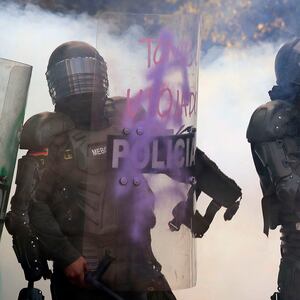ABUJA, Nigeria—On October 3, a horrific video went viral on social media, which showed officers from the Nigerian police force’s notorious Special Anti-Robbery Squad (SARS) dragging two young men from a hotel in Lagos and executing one of them in the street.
The video was a tipping point for many Nigerians. For the past three weeks, tens of thousands across the country have taken to the streets calling for the scrapping of SARS. The government, after years of inaction on the violent unit, has finally been forced to disband it—but critics say the worst offenders are just being moved to different roles.
On Tuesday, several Nigerians were killed when government soldiers opened fire on the anti-police brutality protesters in the capital of Lagos, according to Wall Street Journal.
Reports of brutality by SARS are common in Nigeria. The rogue police unit has in recent years been criticized publicly by activists and politicians for extrajudicial killings, illegal arrests, and torture of citizens. SARS has mostly targeted young men—usually between the ages of 17 and 30 from vulnerable groups and low-income backgrounds—whom they often accuse of being internet fraudsters or armed robbers.
In one of its numerous brutal acts, personnel of the Nigerian police force’s Special Anti-Robbery Squad (SARS) arrested prominent radio host Kofi Bartels a year ago for filming five SARS officers beating a boy just outside the journalist's compound in the oil-rich southern city of Port Harcourt. Like so many young men arrested indiscriminately across Nigeria by SARS policemen, Bartels says he was tortured while in police custody and officers threatened to put him in a prison cell with a male inmate who would rape him. A photograph of the journalist lying injured on a bed following his alleged assault by the police was published by a number of media outlets including the Committee to Protect Journalists (CPJ).
"They [SARS officers] used all kinds of objects on me and left me with a fractured knee," Bartels told The Daily Beast. He was released hours after his arrest following the intervention of a former commander. "The incident left me terribly traumatized."
Although the police apologized and promised to punish officers who tortured Bartels (PDF), there's no evidence to prove that anyone was ever punished for the journalist's ordeal.

A man pastes a sticker on a fellow protester that reads "END SARS NOW" along the Lagos -Ibadan expressway during a demonstration to press for the scrapping of Special Ant-Robbery Squad (SARS) on October 19, 2020. At least 15 people were killed, including two policemen, since protests against police brutality erupted in Nigeria this month, according to Amnesty International.
PIUS UTOMI EKPEI/AFP via Getty ImagesSince the protests began, the hashtag #EndSARS has consistently been trending on Twitter with thousands using it to share very disturbing stories of SARS aggression. There have also been casualties, as nearly a dozen demonstrators have been killed by the police while demanding change, according to Amnesty International.
Concerns about escalating violence against the #EndSars protest movement grew on Monday after armed thugs attacked demonstrators at the headquarters of the central bank in the capital, Abuja, and police fired tear gas at people protesting peacefully at the heart of the city.
In the northern city of Kano, reports that a 17-year-old boy in police custody was tortured to death by officers prompted protests in the very busy Kofar Mata area, with demonstrators reportedly barricading the main road and setting tires on fire while chanting songs calling for an end to police aggression.
Across the country, more and more people turned up at protest grounds demanding action from the government against SARS. Fighting tears, one protester recalled how officers took the life of a close friend.
"SARS officers killed my neighbor and three of his friends simply because they were young boys heading home in the same car so late at night." Isaac Anani, a medical laboratory scientist in Abuja, told The Daily Beast about an incident that occurred six years ago. "Despite a huge public outcry, the culprits escaped full punishment and SARS continued to brutalize innocent citizens."
On social media, celebrities across the world including Cardi B, Drake, P Diddy, Trey Songz, and Viola Davis have tweeted their support for the #ENDSARS campaign. Although the issue only just gained international attention with the latest protests, campaigns for the disbandment of the notorious squad have been going on for years in Nigeria.

Protesters carry banners during a demonstration to press for the scrapping of Special Ant-Robbery Squad (SARS) on Abuja-Keffi Expressway, Abuja, Nigeria on October 19, 2020.
KOLA SULAIMON/AFP via Getty Images"Nigerians have become so tired of listening to the news and hearing of another story of SARS officers killing a young person." Marc Bisong, a Nigerian human rights lawyer who has been protesting across the country, told The Daily Beast. "If we don't get the authorities to deal with this issue of SARS brutality, we risk having more of our brightest youths killed by very heartless officers."
In its most recent report on police impunity in Nigeria released in June, Amnesty International, which documented 82 cases of ill treatment and extra-judicial execution by SARS officers between January 2017 and May 2020, revealed that many detainees in SARS custody are subjected to severe beatings—mostly carried out under the supervision of high-ranking police officers—and denied medical care. The victims, according to the report, are often unlawfully arrested in raids on television viewing centers and recreational centers and are held in detention and forced to pay huge bribes to secure their release, with those unable to pay subjected to torture or other ill-treatment.
"No SARS officer has been held accountable for human rights violations documented in this report," Amnesty revealed. "Many victims of SARS violations face obstacles and, in some cases, concerted opposition from the police authorities while seeking justice, including threats to their lives."
The first major social media campaign against SARS brutality in Nigeria occurred in December 2017 after a video was posted on Twitter showing an angry mob chasing after a vehicle carrying SARS officers, who were fleeing the scene after killing a man. Many shared graphic footage of overbearing police brutality and an online petition was created calling for the controversial squad to be disbanded. A judicial commission of inquiry to investigate the activities of SARS and recommend reforms was established the following year by the Nigerian government—but the commission's findings, which was quickly submitted to the government, have been kept away from the public for about two years now.
"It just shows the lack of genuine interest and commitment to bringing an end to SARS," said Bisong, the human rights lawyer. "Since Nigerians began to campaign against SARS a few years ago, the only thing the government has done is make failed promises."
The response by authorities to the ongoing protests has been swift. President Muhammadu Buhari early last week approved the disbanding of SARS while Nigeria's police chief, Mohammed Adamu, announced the formation of the Special Weapons and Tactics (SWAT) to replace the unpopular police unit. But those moves have not been enough to quell the anger and protests have continued.
"What the government has done is simply rebranding SARS," Uchenna Okechukwu, a protester in Abuja, told The Daily Beast. "The fact that SARS officers are still serving in the police and no one has been held accountable for crimes committed against innocent citizens shows that nothing has changed."
The Nigerian police have long struggled with a reputation problem. Four years ago, the World Internal Security and Police Index ranked the country's police forces as the worst in the world and revealed that corruption is a key issue affecting the institution. In the last 25 years, the government has shown little or no responsiveness to numerous demands for reform.
Since the mid-'90s, successive administrations have set up panels to assess and make recommendations to reform the Nigeria Police Force, but their findings have been largely overlooked.
A Presidential Committee on the Reform of the Nigeria Police Force set up in January 2008 (PDF) by then-President Umaru Musa Yar’Adua took a look at the reports of four government panels since 1995 and noted the failure of the government to implement the recommendations of the former committees. Recommendations made by committees set up in 1995, 1997, 2002, and 2006 were either completely ignored or not fully implemented, according to the 2008 presidential panel, which made a number of suggestions to the Nigerian government, including reforming the budgetary process of the police to effectively check corruption and creating a credible public complaint mechanism. As usual, those recommendations were never fully considered by authorities.
As impunity and abuses by the police—particularly SARS—persist, the Nigerian people are displaying their energy and spirit. Across the country women and youth have been the driving force of the protests that keep growing by the day. Abroad, the Nigerian diaspora community has organized demonstrations in solidarity with their counterparts at home, with #EndSARS protests taking place in Canada, Germany, the United Kingdom, and the United States. The voices of young people in Africa's most populous nation have never been this amplified.
"Until all those police officers who've abused, tortured, and killed innocent Nigerians are held accountable, we are not going to end our protest," said Bartels, who's one of the young people leading the protest in Port Harcourt. "The Nigerian people can no longer be taken for granted."


